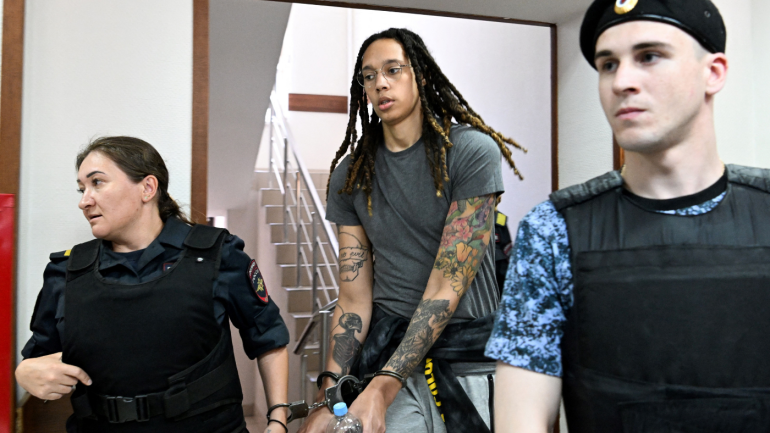
Phoenix Mercury star Brittney Griner pleaded guilty to drug charges in a Russian court on Thursday, and she faces up to 10 years in prison. However, in a statement she read before the judge, Griner maintained there was no intent to break Russian law.
"I'd like to plead guilty, your honor. But there was no intent. I didn't want to break the law," Griner said in English, which was then translated to Russian for the court proceedings, according to Reuters. "I'd like to give my testimony later. I need time to prepare."
Griner was detained at Sheremetyevo International Airport on Feb. 17 after the Russian Federal Customs Service claimed to have found vape cartridges containing the marijuana concentrate hashish oil in Griner's luggage. She has been charged with "large-scale transportation of drugs."
After 130 days of detention, Griner's trial began on July 1, and her next court date is set for July 14. While she initially declined to enter a plea, the expectation was that she would eventually plead guilty, as she did on Thursday.
"Traditionally, the best defense is to admit your guilt and hope you get a lesser sentence," William Pomeranz, the acting director of the Wilson Center's Kennan Institute in Washington and an expert on Russian law, told ESPN earlier this month. "There's not a lot of examples of people raising strong defenses and getting acquitted."
Despite the serious charges against her, an official admission of guilt was the best option for Griner in both the short and long term. First and foremost, the nature of the Russian legal system meant there was essentially zero chance she would be acquitted, according to TJ Quinn. Pleading not guilty and putting up a fierce defense may have led to retribution from Russian authorities while she remains detained.
Looking further ahead, an admission of guilt is a necessary pretext to a potential prisoner exchange. Russian authorities have signaled an interest in a prisoner swap that would free Viktor Bout, a convicted arms dealer who is currently serving a 25-year sentence in the United States. However, the vast discrepancy between the two offenses would make such an exchange difficult for the White House to justify, per the New York Times.
There is also no timeline for when, or if, such an exchange might happen. "Attempts by the American side to make noise in public… don't help the practical settlement of issues," Russian Deputy Foreign Minister Sergei Ryabkov said on Thursday. "There are no formal or procedural reasons to talk about any further steps" until Griner's trial is over, Ryabkov added.
On the Fourth of July, a handwritten note from Griner was delivered to President Joe Biden, which read in part, "As I sit here in a Russian prison, alone with my thoughts and without the protection of my wife, family, friends, Olympic jersey, or any accomplishments, I'm terrified I might be here forever."
Biden and Vice President Kamala Harris later talked with Griner's wife, Cherelle.
"The President called Cherelle to reassure her that he is working to secure Brittney's release as soon as possible," the administration said in a statement. "The President offered his support to Cherelle and Brittney's family, and he committed to ensuring they are provided with all possible assistance while his administration pursues every avenue to bring Brittney home."

















